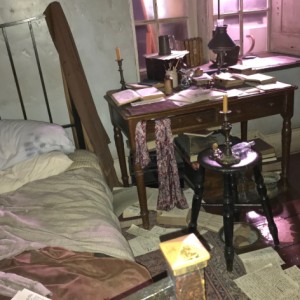Damp Haworth
We made an early start this morning and drove along a very familiar route to Bradford. We were visiting friends, first in Baildon, then in Haworth and, as we travelled between the two, we were using roads full of memories. So much of our life was spent in this area that it was a bit like going back in time. I think both of us will always be Yorkshire people at heart.
Anyway, we caught up with people we have known for a long time, went out for lunch with a dear friend and ended up back in Haworth for a wander down the old street, still cobbled, but not quite like it used to be. The quality of the shops has improved though. Then I went into the Brontë Parsonage, as I wanted to see the exhibition that was there for the bicentenary of Branwell Brontë. This was curated by Simon Armitage and I was impressed with what he had done. It was certainly much better than the disappointing one done for Charlotte last year.
And I got to write one line of Wuthering Heights in a handwritten manuscript, just as NannaK did when Wendy took her to the Parsonage in September.
A good, but quite emotional day in many ways.
*************************
Don’t read any further unless you are really into the Brontës.
Part of the exhibition was made up of a series of 11 objects linked to Branwell, for each of which Simon had written a poem. I really liked this and bought a copy of the nicely produced booklet that accompanied it. The idea was to explore Branwell’s colourful history and mark his rise and fall.
But the part of the exhibition that made the most impact was the installation in the parsonage itself; a dramatic recreation of Branwell’s room, in the actual room he used whilst living in the house (see extra). The installation imagines how the room might have looked during the 1830s, when Branwell had ambitions to be a painter, a writer, a poet. So paint is splattered, paper is scattered, hopes and dreams are envisaged and torn apart. He disappointed his family; he disappointed himself. I think this room says it all.
The central event that Simon uses was when Branwell, as a nineteen year old budding poet, wrote to Wordsworth, enclosing a poem and asking for an opinion. The letter, full of arrogant enthusiasm, was never answered.
This is Simon Armitage’s poem:
William, It Was Really Nothing
The young pretender has cocked his hat
towards Westmorland. Picture the great bard,
mid-breakfast, letter in hand,
eyes on stalks and jaw hanging loose,
a loaded knife-blade of Dorothy’s damson preserve
stalled between lidded porcelain jam-pot and toast,
blood-scabs of red sealing wax crumbed
on the cloud-white tablecloth.
(Thinks: if Paul Pogba cost eighty-nine million plus,
what am I worth?). Except
what glittered like charmed finches over Haworth Church
drifts as rain across Scafell Pike. No reply:
the parsonage clock patrols the night-shift
in jailors’ boots. Outside the moors play dead.


Comments
Sign in or get an account to comment.


